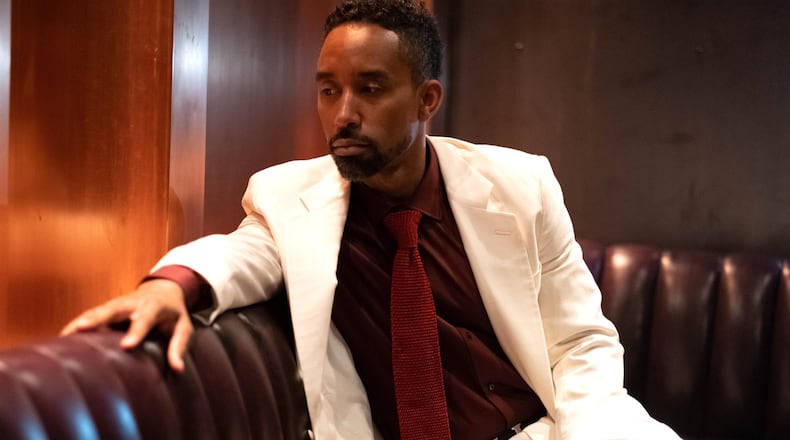Johntá Austin could likely walk through Lenox Square Mall unnoticed, but the Grammy-winning songwriter and producer is responsible for a mountain of recognizable songs.
Mariah Carey, Usher, Justin Bieber, Mary J. Blige, Lionel Richie, Drake, Janet Jackson and Ciara are only a few of the marquee names on Austin’s resume, with major hits including “We Belong Together” and “Be Without You” bearing his imprint.
The Atlanta-bred artist, 39, is renowned for his work with others. But since 2008, he’s labored over a solo album that will finally arrive for public consumption on Aug. 2. “Love, Sex & Religion” was recorded primarily in the studios of producer pals Jermaine Dupri and Troy Taylor and aims to present a deeper facet of R&B, with meaningful lyrics and memorable melodies.
The first single, “Love Angel,” is about “how desire is angelic,” Austin said.
During a recent call, the thoughtful singer-songwriter-producer touched on the inspiration behind his soulful solo album, the future of R&B and why he’s rooting for fellow Atlantan Lil Nas X.
Q: You’re one of those guys who could have re-established yourself in New York or Los Angeles, yet you’ve stayed true to Atlanta. What is the allure?
A: My family is here. And it's the culture, man, that raised us and gave us that vibe and that energy to do what we do. I still call myself a southern boy. If you want to get out and turn up and do that, Atlanta has that. And if you want to stay out of the mix, Atlanta has that as well. But the energy that allows us to make the content is here.
Q: This long-in-the-works album is called “Love, Sex & Religion.” Why those three tenants of life?
A: (Laughs) It covers it all, doesn't it? For me, I feel like they could exist together. Love and religion exist, but add sex to that mix and people go, "Ohhhh." But I feel like they are all intertwined because the Creator, whoever you believe it to be, came up with all of those things to be intertwined. I believe love is pure, sex is pure. It's the religious aspect that has made us treat sex as a forbidden thing, but I think it's a beautiful thing and when you combine those things together, it's really good. We wanted to challenge that thinking. We have songs like "Born Again" and "Making Love to God." I think it might raise some eyebrows when people see the title, but when you listen to the lyrics, it makes sense.
Q: How did this become the right time to finally release it?
A: I decided to go for it. People have heard about "Love, Sex and Religion" since 2008. When I joined Twitter, I joined as Johnta LSR (as my handle). "Born Again" and "Making Love…" were the first two songs that we recorded for the project back then. They've undergone some cosmetic surgery over the years. One of the inspirations behind it, I was listening to George Michael's "Faith" one day and remembered how controversial that was, blending the physical and spiritual, and I was like, "Man, we could really go there and go even deeper." More recently over the last year, more songs have come in. (Atlanta producers) Bryan-Michael Cox and Troy Taylor and I got to talking and decided, it's never going to be the perfect time. The perfect time is whenever you make it.
Q: Are you planning live shows to support the album?
A: We're gonna work on some live dates, some in Atlanta, New York and L.A. We'll definitely be out performing live. To get that energy from the crowd, I love it.
Q: Whatever happened with your “Ocean Drive” album?
A: We went through a couple of iterations with it and homes for it. Then we left Virgin Records after Jermaine left and went to Island Records and Jermaine left that situation. It was kind of a thing that each time I was given the opportunity to stay on board or stay with Jermaine, both times I picked the latter because Jermaine believed in me as an artist and you want to where people see the vision. So that album never came out, but we got three songs from it (on the new album). "Ocean Drive" was about being fly, but I wanted to go a little deeper.
Q: Do you feel as if R&B got a little too glossy, a little less meaningful in the past decade?
A: It's crazy because we would have songs like (Mariah Carey's) "We Belong Together" or Usher's "Burn" that Jermaine did and those songs are great and sit at the top of the charts for weeks. But ultimately the shift in R&B came when hip-hop became a lot more popular and it was jams you could play in the club. It's that need to want to hear yourself in the club that tugged on some R&B artists. To a degree, I started hearing where we sacrificed songs. I get it, it's fun. You don't want to be next to Jay- Z or Puff (Daddy) in the club and it's all their songs being played and you can't party to your own music. But as a result, the songs and the storytelling we got used to hearing in R&B we didn't hear anymore.
Q: Are there any artists you think are helping to push back against that?
A: With Bruno (Mars) and Daniel Caesar, we've gotten back to more storytelling, more R&B. We now have artists who are brave enough to do that. You can have a young artist like Ella Mai and kids love it and the older generation loves it. If it's a great song, it can land in any generation. I think the young generation, they appreciate some of the older songs.
Q: You’ve worked with Mariah, Janet, Drake, Lionel – what do you learn from these artists?
A: What I've learned from them is to be committed to the story that you want to tell and be confident about it. No one is going to tell the story the way you want to tell it. Mariah knows exactly what she wants to say. A writing session with her is always fun because she has an idea of what she wants to say. LA Reid once told me all we can do is essentially shine the stars - I can enhance your vision, but I can't birth your vision. When you work with a Mary (J. Blige), a Mariah, Usher, they know what they want to say and they're confident in it. We have to give to the people and the people will tell us if they can relate to it. I learned from Jay-Z, I always speak my truth and then turn it over to the people. The public isn't stupid. They know if Johnta is doing his best Johnta impression.
Q: Tell me about your relationship with Jermaine Dupri. You guys have done a lot of things together.
A: I met him in the early '90s when I was trying to get into the music business, but it was (Bryan-Michael) Cox who made the connection as far as the writing. I remember getting a call one day saying, "JD wants you to come down." I had been waiting for that day to happen. JD was the guy who had the SoSo Def billboard and Kris Kross. Over the years, the mentoring and the friendship, the road that he's paved for all of Atlanta, it's been great. To me, some of the biggest moments of my career don't happen without Jermaine. Even the opportunity to finally emerge and put out an album as an artist. To me, Jermaine is the greatest producer of my generation. I often say there aren't many creatives that you go into a room and come out with the finished product.
Q: You and Jermaine worked on Mariah’s “We Belong Together,” which Billboard listed as Song of the Decade from 2000-2010. And now we’re almost at the end of another decade.
A: I know! Soon we're going to pass the torch to another song of the decade.
Q: The way Lil Nas X is going, it might be him (the Atlanta rapper-singer just broke the Billboard Hot 100 record with 17 weeks at No. 1 on the chart).
A: I would love nothing more than for Lil Nas X to get it, to pass the torch to someone in Atlanta.
About the Author
Keep Reading
The Latest
Featured





